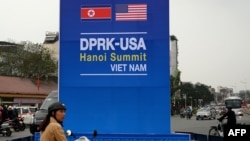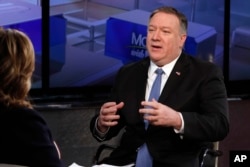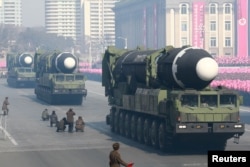The U.S. does not intend to ease economic sanctions against North Korea until it is confident the North has “substantially reduced” the threat it poses as a nuclear-armed country, Secretary of State Mike Pompeo said Thursday.
“The American people should know we have the toughest economic sanctions that have ever been placed on North Korea, and we won’t release that pressure until such time as we’re confident we’ve substantially reduced that risk,” Pompeo told NBC’s Today show.
North Korea says sanctions are partly responsible for what it calls a food crisis. Pyongyang is demanding the sanctions be eased and is asking the United Nations for food help.
The U.N. says 41 percent of North Koreans don’t have enough to eat.
Secretary Pompeo’s comments come a week ahead of President Donald Trump’s second summit with North Korea leader Kim Jong Un in Hanoi.
Pompeo said he is “very hopeful” Kim “will fulfill the promises that he made in Singapore last year” at the first U.S.-North Korea summit for Pyongyang’s “complete denuclearization.”
But neither side has spelled out how and when North Korea would disarm, and U.S. intelligence reports suggest Kim has not moved to destroy his nuclear arsenal.
Director of National Intelligence Dan Coats told a congressional panel last month that North Korea “has halted its provocative behavior” by refraining from missile tests and nuclear tests for more than a year.
“As well, Kim Jong Un continues to demonstrate openness to the denuclearization of the Korean Peninsula,” Coats said.
Despite the end to testing, Coats said, “We currently assess that North Korea will seek to retain its (weapons of mass destruction) capabilities, and is unlikely to completely give up its nuclear weapons and production capabilities.”
“Our assessment is bolstered by our observations of some activity that is inconsistent with full denuclearization,” he added.
Coats said the North Korean leader and the rest of the country’s rulers “view nuclear weapons as critical to regime survival.”
The recent assessment is at sharp odds with Trump’s boast after returning to Washington after the June Singapore summit: “Just landed — a long trip, but everybody can now feel much safer than the day I took office. There is no longer a Nuclear Threat from North Korea.”
Pompeo said denuclearization is “what we have to get for the American people. We have to reduce the threat of a nuclear-armed North Korea. And then in turn, we can work on peace and security on the peninsula and a brighter future for the North Korean people.”
Pompeo said he hopes Trump and Kim will take a “truly historic step forward” at their meeting in the Vietnamese capital.









